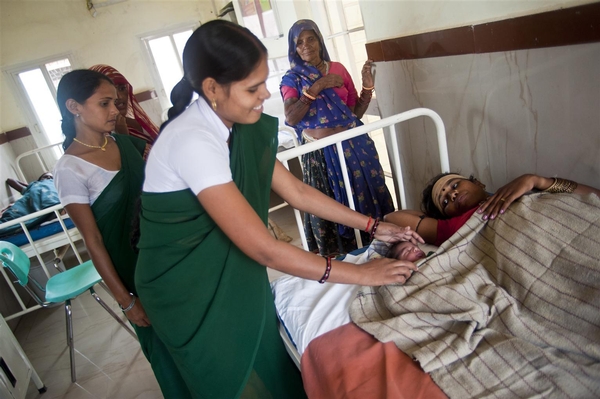A Partner Forum on Quality Improvement Towards Achieving LaQshya (National Labour room Quality improvement Initiative) took place in December 2019, in New Delhi, to discuss how to expand and sustain quality improvement for maternal, newborn and child health across India. The Forum was organized by the Nationwide Quality of Care Network (NQOCN) in collaboration with LaQshya Programme Management Unit, Ministry of Health & Family Welfare (MOHFW), and with the support of the World Health Organization’s South-East Asia Office and India country office.
Three years after the Ministry of Health & Family Welfare launched LaQshya to reduce preventable maternal and newborn mortality, morbidity and stillbirths associated with the care around delivery in facilities and ensure respectful maternity care, the first forum of this kind brought together State Governments, institutional partners, NGOs, development partners, private sector partners and funding partners to share lessons on quality improvement challenges and ideas to sustain the progress accomplished so far. The Forum was opened by Dr. Ajay Khera, Commissioner, MCH, and Dr Dinesh Baswal Joint Commissioner for maternal health, MOHFW India.
Sharing experiences at all levels of the health system was a key aspect of the Forum, with leaders from the states of Rajasthan, Uttar Pradesh, Gujarat and Maharashtra presenting the work that they have done at state level to deliver high quality care maternal and newborn health services. Individual facilities from across the country also had the opportunity to share their experience of implementing quality improvement.
It was highlighted that the whole of the health system is required to produce good quality of care for achieving desired outcomes. LaQshya initiative includes Quality Assurance (certification of labour rooms), clinical mentoring of healthcare team and quality cycles. These main three processes must happen concurrently in all health facilities at the same time for maximum effect on quality of care.
A series of panel discussions looked into LaQshya’s challenges and lessons so far, the prerequisites to create a sustainable model for quality, the use of data and technology for quality improvement, client feedback and the specific obstacles to infection prevention and control in labour rooms.
The Forum made a series of recommendations to the Ministry of Health & Family Welfare to ensure a sustainable growth and expansion of quality improvement across the country:
- Establish a national QOC centre/structure at state and district levels to facilitate spread and development of quality of care concept across the country.
- Develop a dedicated cadre for quality professionals
- Develop mechanisms to involve the private sector in a sustainable way in quality improvement, given that private providers are responsible for the largest part of out-patient care and a sizeable part of in-patient care.
- Enable community-led monitoring at the earliest, to bring community in the care delivery process.
- Implement quality improvement in primary care and community care settings as these are at the bottom of the pyramid, affect the largest part of the population and could be a learning ground for testing various means of community-led development of local quality improvement models.
Photo: Midwives check up on a newly delivered child at the Chharch Maternity health sub centre in the Chharch district of the cenral Indian state of Madhya Pradesh, in September 2011. © UNICEF/UNI117754/Halle'n.


